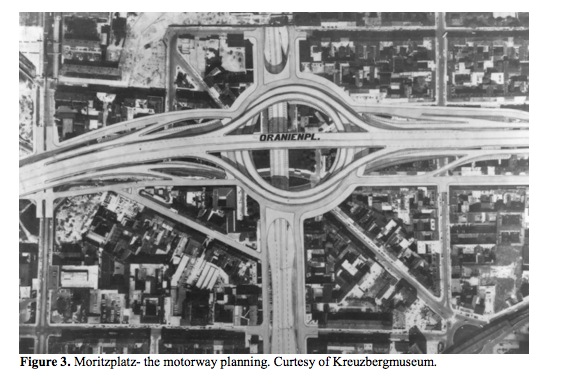
2014 hatte die mit uns befreundete Landrechtsorganisation 596 Acres an der New Yorker „New School“ ein Symposium zu Aneignung von Freiräume organisiert. Unter dem Titel „Turning Vacant Acres into Community Resources“ waren Forschende und AktivistInnen aus den gesamten USA und 4 internationale Praxisbeispiele zusammengekommen, um sich über Strategien der Nutzung öffentlicher Flächen auszutauschen. Die Ergebnisse des Symposiums sind jetzt in der Sondernummer Urban Vacant Land and Community Access des Fachmagazins Cities and the Environment veröffentlicht worden (Inhaltsverzeichnis s.u.). Der Beitrag zur Bodenpolitik in Berlin am Beispiel des Prinzessinnengarten findet sich hier: Urban Agriculture between Pioneer Use and Urban Land Grabbing: The Case of “Prinzessinnengarten” Berlin (Marco Clausen) PDF
Zusammenfassend heisst es:
Conclusion: The experience of Prinzessinnengarten suggest that cities can learn from the experimental activities that develop outside of “business as usual” planning and development. These experimental activities are important because they both address contemporary issues and anticipate future economic, social, and ecological challenges. Tomorrows Possibilities grow in the gaps of conventional planning processes, nurtured by social desires and needs. At the same time, there is the danger that these places, the movements they represent, and as well the visions, narratives and terms they create will be appropriated by the process of transforming commons into commodities, alternatives into lifestyles and poor neighborhoods into gentrified areas. Recognizing this risk and conscientiously protecting the principles guiding the development of community driven projects like ours, is an important aspect of the work of those who advocate for the transformation of public spaces into open and free urban commons
Weitere Beiträge
Editor’s Introduction
Transformation of Urban Vacant Lots for the Common Good: an Introduction to the Special Issue
Peleg Kremer and Zoé Hamstead
Special Topic Articles: Urban Vacant Land and Community Access
Inventorying Land Availability and Suitability for Community Gardens in Madison, Wisconsin
Francis Eanes and Stephen J. Ventura
Cities, Gardening, and Urban Citizenship: Transforming Vacant Acres into Community Resources
Matthew DelSesto
Facilitating Social-Ecological Transformation of a Vacant Lot on an Urban Campus: the Houston-Congolese Connection
Sister Damien Marie Savino
Practitioner Notes
From Open Data to Open Space: Translating Public Information Into Collective Action
Paula Z. Segal Esq.
Urban Agriculture between Pioneer Use and Urban Land Grabbing: The Case of “Prinzessinnengarten” Berlin
Marco Clausen
Supporting Our Land Stewards: Building a Constituency to Change Policy and Preserve Philadelphia’s Gardens
Amy Laura Cahn Esq.
The Land Trust Solution: How Baltimore Green Space Uses Land Ownership to Help Neighborhoods
Miriam Avins
Self Help Nuisance Abatement in Baltimore City
Becky Lundberg Witt
Permanently Grassroots with NeighborSpace
Ben R. Helphand
Coupling Benefits: Strategies for Vacant Land Reuse along Cleveland’s Opportunity Corridor
Jeffrey Kruth
Feeding Citizenship: strategies for accessing and transforming spaces
Gaëlle Janvier and Justin Doucet
